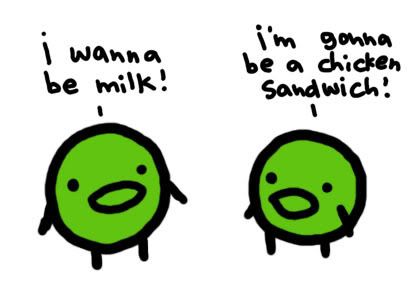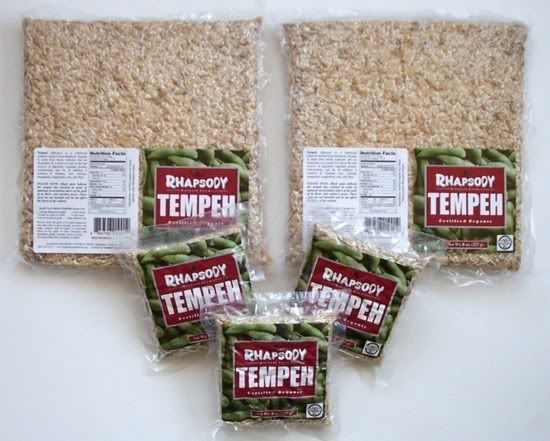Date: Aug 5, 2008 1:09 PM
 ..
..A few individuals have been incredibly successful at demonizing this little legume, and I think it's time to address their fear-mongering - How in the world did an innocent bean become the subject of intense ridicule and fear? I hope I can put a few things in perspective for you
IT'S A BEAN The first thing I want make reeeeeeally clear is that we're talking about a bean! A bean! Soy bean – it's a bean - It's not a toxin - It's not a chemical - It's not a weapon - It's a bean, it's a legume, a plant food - The way some people talk about soy beans would make you believe that they're threatening the very survival of the human species - Who are these people and why are they bean bashing?
CRITICAL THINKING Well, the general answer to that question is actually more questions - Whenever you're given any information – particularly when there are scare tactics or fear-mongering – always ask yourself: 1) Who is providing this information? 2) What do they have to gain directly? 3) What do they have to gain indirectly?
It's so important to hone our critical thinking skills, particularly these days when we're bombarded with and overwhelmed by so much information - Our access to information – through the Internet – is a good thing, but it also means we have a lot more rubbish to sift through
Particularly when it comes to something like vegetarianism and animal rights, people have no idea how powerful the machine is that drives the anti-vegetarian, pro-meat/pro-animal exploitation industry agenda -This machine is driven by corporations, the government, and media – and it's incredibly powerful - I'm not saying this to make you cynical, because I find cynicism really boring and really unattractive - I am saying this so you know how important it is that you know where you're getting your information from and to think really critically about what it is the messenger has to gain
Soy and vegetarianism are so intricately linked that the soy detractors know if they scare people about soy, they scare people about vegetarianism, and it's working - A lot of these groups and individuals have a meat agenda - you can see for yourself on their websites

VERSUS WHAT? So what does all of this have to do with soy? Well, there are a handful of individuals and "organizations" who've made it their mission to demonize soy, namely the Weston Price Foundation, Mercola, and Kaayla Daniel, who wrote The Whole Soy Story - But one of the things we need to keep in mind – if we want to be thoughtful, critical, savvy thinkers is that thousands of conclusive, lab, clinical, epidemiological studies undeniably point to the harmful effects of meat, dairy, and eggs and benefits of plant foods - And yet so many people have bought into the fear-mongering about soy - Can you imagine if – in our behavior – we actually reflected these truths? Can you imagine if we sincerely and lovingly said to friends and family: I'm sorry – you eat meat and drink cow's milk – don't you know these are linked to heart disease, cancer, diabetes, stroke, high blood pressure, gout, etc - Can you imagine if we actually put credence into what we know is true - We don't say that to non-vegetarians, but when someone wants to criticize vegetarianism as a whole – one of the first things they say – right after they ask where you get your protein – is "soy is dangerous" - Soy causes breast cancer - Soy causes dementia - Soy makes boys turn into girls – I swear to God – I've heard 'em all
So, here are the main points I want to make about soy, and I'll go into a little more detail about each one
1) You don't have to eat soy foods to be vegetarian/vegan - There are thousands of edible plant species available if you don't like or have an allergy or sensitivity to soy - 2) Eat foods in their whole state as much as possible- Tofu, tempeh, miso, edamame, tamari/soy sauce all experience either no processing or a limited amount of processing - Make whole foods the foundation of your diet - 3) Soy is neither miracle food nor is it poison - It is a bean that, like other plant foods, like other beans, contains health-promoting nutrients - 4) Be informed so you can help debunk the myths) I can't stress this enough - We don't have to have a degree in nutrition to dispel the myths – even if you just get people thinking by encouraging them to dig deeper to find out whose behind the scare tactics, that's enough

In Detail:
1)You don't have to eat soy foods to be vegetarian - Let's face it, soy foods are linked with vegetarianism whether we like it or not - When someone hears vegetarian, the first thing people think is soy foods - Well, you can enjoy a varied, full, delicious, nutritious diet without soy foods - Some people don't like tofu or tempeh (because they haven't been to one of my classes or tried my recipes), so fine - Some people are allergic to soy - OK – some people are allergic to peanuts or strawberries – that doesn't mean peanuts are inherently bad or strawberries are inherently evil - So, just because someone's allergic to soy doesn't mean soy in and of itself is bad - That's 1 – you don't have to eat soy
2) Eat foods – all foods, including soy – in their whole state - So what are these foods and why should eat them in their whole state? Well, to answer the second question first: One of the things that's happening is that concentrated soy protein is being put in a number of processed foods – everything from Clif bars and cookies to ice cream and pudding – it's showing as soy isolate protein or isolated soy protein, and there are a couple problems with that - One is that we don't know what the effects are going to be, because our diets have never been so full of these isolated proteins in these processed foods - We don't know - In the laboratory, scientists have extracted soy protein and soy isoflavones to determine their effects on the bodies of non-human animals and then try to interpret this to human experience, to human health, which is problematic for a number of reasons – particularly because of the differences in physiology and genetics between humans and non-human animals (thus animal science do not work) and also because there's a real problem with isolating nutrients

I've talked about this before: the complexity in a blueberry is beyond what we can replicate in a lab and its health benefits stem from the combination of all of its components eaten all at once in its whole state - So, to isolate the seemingly beneficial properties of something like soy to prove its health benefits or dangers is not sound – in my opinion - But nobody asked for my opinion when the benefits of soy were regarded as an opportunity to make a lot of money - So in the last 10 years or so, the inclusion of isolated soy protein in processed foods has increased tremendously - And that means a lot of money to be made
So, what's the common denominator here? Is the problem with soy in general? Or isolating soy proteins? Is the problem with soy in general? Or with processed foods? There's a big difference between isolating the protein and putting it as filler in every packaged food on the grocery shelf and eating whole soy foods - So that leads to the answer to my other related question - What are these whole soy foods?
Well you have your unprocessed soy foods such as tempeh, miso, whole soybeans such as edamame, natto (a fermented soy food eaten in Japanese cuisine), tamari/soy sauce, and soybean sprouts and you have your minimally processed whole soy foods, such as tofu and soy milk - Soy milk and tofu are included as "whole foods" because the processing involved – heat from cooking and blending of the whole soybeans with water and coagulants – does not turn them into purified isoflavones - Yuba, a byproduct of soy milk, would also fall into this category - Whole soy foods

The problem isn't soy - The problem is processed foods - The more the foundation of our diet is whole plant foods, the healthier we will be and the less confusing all of this will seem - Now, does mean we can never have a little soy cheese on our pizza or we can never enjoy something like TVP (texturized vegetable protein) in our chili? No - The research does not support the conclusion that eating a little processed food is going to be detrimental – just don't make it the foundation or the mainstay of your diet - Should we be afraid of consuming soy foods as a part of a healthful, whole foods, plant-based diet? No - Should we eat a soy-based diet? No - Variety, variety, variety
3) Soy is neither miracle food, nor is it poison - Be wary of health claims made about single nutrients - You don't have to become a nutritionist to eat healthfully and to make sense of it all - In fact, I think it's our focus on single nutrients that is making everyone so bloody confused about how to be healthy
Related to what I said about becoming critical thinkers, it's so important we take the latest scientific studies with a grain of salt and just relax and eat a whole foods plant based diet - It's really that simple - It doesn't have to be complicated, but everyone's so confused because of studies that come out every day! One thing to keep in mind is that often when you hear something like "scientists conclude" or "studies show" or "research reveal---" you have no idea what the details are and the sound bites are not sufficient to make us understand - Was the study based on animal research, which is difficult to interpret to human physiology? How many people were in the study? Was it a test-tube study and has it be extrapolated to a real human population? If it was a clinical study, is there a chance people lied in the questionnaire? Are the reports of the study quoting the whole study (i e did the journalists do their own research) or are they merely quoting an abstract – or worse yet – a press release? Is the use of language misleading or misinterpreted? Is it biased information based on studies done by the meat, dairy, egg, sugar, or soy industries or even by those who advocate the consumption of those foods, such as the Weston Price Foundation and Mercola, who advocate meat from every animal under the sun? It's important we ask these questions when we hear about the latest study before drawing conclusions that will effect our own health, the health of our loved ones, and the lives of animals
So, don't rely on sound bites from the media about what's healthful - It's really not very complicated - Eat a whole-foods plant-based diet, including whole soy products if you want them - If you don't like them, don't eat 'em - Although, if you WANT to learn to like them, come to one of my cooking classes or check out my cooking DVD, in which there are two tofu recipes, the purpose of which is to empower people to understand the different kinds, which helps demystify it
http://www. compassionatecooks. com/video. htm
4) Become Informed and Pass it On! There have been a number of negative claims about soy (though the overwhelming research is positive), and I invite you to check out the details yourself, and you can do so by visiting a page on http://www. compassionatecooks. com/ under Resources: Cooking & Nutrition Info - There's a document called the Safety of Soy, and it repeats some of what I'm saying here, but it also provides links to a few different sites that go through each of the negative claims point by point and puts them into context - Of all of them, my favorite is the first one, Eating Soy: Myths, Truths, and Everything in Between by Christa Novelli, M P H I think she does a fantastic job explaining each of the claims made so that you'll walk away with a much better understanding of what the heck is going on here - The goal is to be informed and empowered – for yourself and so that you can pass along the correct information to those who are misinformed - Please pass on the correct information – it'll make my job a heckuva lot easier!
FINAL POINTS
I want to say two more things about soy- One is that another argument used against soy, sadly, this often comes from environmentalists, is that the rain forest is being cut down to grow soy beans - Actually, much of the rain forest is being chopped down for cattle grazing, but it's also being chopped down to grow soy--but not for human consumption - Americans and Europeans can't raise all the feed domestically that is needed to sustain their meat addictions, so agribusiness has started cutting down the rain forest -The overwhelming majority of soy (or corn or wheat, for that matter) grown is used to feed animals in on animal factories - In fact, Greenpeace recently unveiled a massive banner over an Amazon soy field that read, "KFC-Amazon Criminal," to accentuate the point that large chicken and other companies like KFC are responsible for the destruction of the Amazon - It takes many pounds of soy or other plant foods to produce just 1 pound of animal flesh--so if you're worried about the rain forests being chopped down for grazing or to grow soy, the best thing you can do is to stop eating other animals
The last thing I want to say is that soy crops – grown for human and cattle consumption – are the most genetically modified crops, so I encourage you to buy organic soy foods - I encourage you to buy organic in general, but please make a point to buy organic soy in particular - At this point, under the current standards, if it's organic, it's not genetically modified, but stay tuned, and check out the Organic Consumers Association and join their mailing list to stay on top of those issues
We need to be informed, we need to inform others, and we need to hold people accountable - Whenever we hear someone make claims about something that just doesn't make sense, it is up to us to counter their ignorance with information - We're not taught to have keen critical thinking skills, and we're manipulated every day by the media and advertising - Armed with the right information, we can push back
*********************
To Learn About the Meat & Dairy Industries Click On The Link Below:
_______________________________________________________

Peace
__________________________________________________________


No comments:
Post a Comment